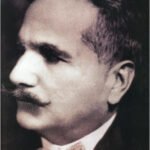
Parinday ki faryad (translate: the bird’s longing) is a children’s poem in Urdu, authored by Pakistan’s national poet, Allama Muhammad Iqbal and published in his book, Bang-e-Dara.
In this poem, Iqbal has portrayed a caged bird’s longing for freedom.
Read parinday ki faryad below, along with its English translation.
آتا ہے یاد مجھ کو گزرا ہوا زمانہ
وہ باغ کی بہاریں وہ سب کا چہچہانا
[Aata hai yaad mujh ko guzra hua zamana]
[Woh bagh ki bahaaren woh sab ka chehchehana]
I am constantly reminded of the days gone by—
The springs in the gardens, the cheerful chirping of all
آزادیاں کہاں وہ اب اپنے گھونسلے کی
اپنی خوشی سے آنا اپنی خوشی سے جانا
[Aazadiyan kahan woh ab apne ghonslay ki]
[Apni khushi se aana apni khushi se jana]
Gone is the freedom of my own nest
Where I could come and go as I pleased
لگتی ہے چوٹ دل پر آتا ہے یاد جس دم
شبنم کے آنسوؤں پر کلیوں کا مسکرانا
[Lagti hai chot dil par aata hai yaad jis dum]
[Shabnam ke aansuon par kaliyon ka muskurana]
My heart aches at the thought of those days
Of buds smiling through dewdrops’ tears
وہ پیاری پیاری صورت وہ کامنی سی مورت
آباد جس کے دم سے تھا میرا آشیانا
[Woh pyari pyari soorat woh kamni si moorat]
[Abaad jis ke dum se tha mera aashiyana]
Of that sweet, enchanting face, that delicate, graceful figure
Which once brought life and joy to my home
آتی نہیں صدائیں اس کی مرے قفس میں
ہوتی مری رہائی اے کاش میرے بس میں
[Aati nahin sadaen is ki mere qafas mein]
[Hoti meri rehaai ae kaash mere bas mein]
Now, I no longer hear those lovely sounds in my cage
I wish my freedom lay in my own hands
کیا بد نصیب ہوں میں گھر کو ترس رہا ہوں
ساتھی تو ہیں وطن میں میں قید میں پڑا ہوں
[Kya badnaseeb hoon main ghar ko taras raha hoon]
[Saathi to hain watan mein main qaid mein pada hoon]
How unfortunate I am, longing for my home
While my companions bask in the homeland and I remain trapped in captivity
آئی بہار کلیاں پھولوں کی ہنس رہی ہیں
میں اس اندھیرے گھر میں قسمت کو رو رہا ہوں
[Aayi bahar kaliyan phoolon ki hans rahi hain]
[Main is andhere ghar mein qismat ko ro raha hoon]
Spring has returned; the flower buds are laughing
Yet here, in this dark cell, I mourn my fate
اس قید کا الٰہی دکھڑا کسے سناؤں
ڈر ہے یہیں قفس میں میں غم سے مر نہ جاؤں
[Is qaid ka ilahi dukhda kise sunaun]
[Dar hai yahin qafas mein main gham se mar na jaaun]
O God, to whom should I tell this tale of sorrow
I fear I may die in this cage, burdened with grief
اس قید کا الٰہی دکھڑا کسے سناؤں
ڈر ہے یہیں قفس میں میں غم سے مر نہ جاؤں
[Is qaid ka Ilahi dukhrra kise sunaun]
[Dar hai yahin qafas mein main gham se mar na jaaun]
O God, to whom should I tell this tale of sorrow
I fear I may die in this cage, burdened with grief
جب سے چمن چھٹا ہے یہ حال ہو گیا ہے
دل غم کو کھا رہا ہے غم دل کو کھا رہا ہے
[Jab se chaman chhuta hai yeh haal ho gaya hai]
[Dil gham ko kha raha hai gham dil ko kha raha hai]
Since my separation from the garden, this has been the state of my heart—
Devouring sorrow while sorrow consumes me
گانا اسے سمجھ کر خوش ہوں نہ سننے والے
دُکھتے ہوئے دِلوں کی فریاد یہ صَدا ہے
[Gaana ise samajh kar khush ho na sunne wale ]
[Dukhte hue dilon ki faryaad yeh sada hai ]
O listeners, do not mistake this lament for a song;
It is the wailing of a wounded heart
آزاد مجھ کو کر دے او قید کرنے والے
میں بے زباں ہوں قیدی تو چھوڑ کر دعا لے
[Azaad mujh ko kar de o qaid karne wale]
[Main be-zuban hoon qaidi tu chhor kar dua le]
Set me free, you who have confined me!
I am a silent prisoner—earn my blessings, by granting me my freedom